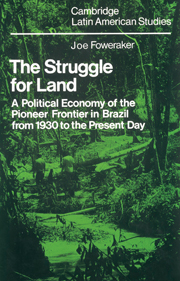 The Struggle for Land
The Struggle for Land Published online by Cambridge University Press: 29 October 2009
Historically a continuing political intervention has been required to reproduce the conditions for accumulation in the Brazilian countryside. In particular it is the different institutions of labour control in the countryside which have effectively contained these conditions through the monopoly of land and the subordination of the slaves or peasants. This pattern of extensive monopoly of land was established during the colonial period. In contrast to Spanish America, the late discovery of precious metals led to a conquest by ‘colonisation’, and sugar production in engenho, not silver mines, shaped the settlement of Brazil (Halperín 1969). At the same time the Portuguese colonial administration commanded relatively fewer resources than the Spanish, and the consequent devolution of power to local landowners led to a socio-juridical division of the land which was far in advance of economic demands (Prado 1962a). However, these demands increased dramatically after the transition from production for a colonially controlled market to production for a world market which by early in the nineteenth century represented a generalisation of appropriation of surplus through exchange relations dominated by commercial capital. At the political level this transition was from control by colonial administration to control by an autonomous Brazilian State: given the political conditions for accumulation, this control was inevitably vested in the State apparatuses in the countryside, which made this incipient State a landowners' State.
During the Empire the landowners were both the dominant class and the class-in-charge of the State (Poulantzas 1968).
To save this book to your Kindle, first ensure [email protected] is added to your Approved Personal Document E-mail List under your Personal Document Settings on the Manage Your Content and Devices page of your Amazon account. Then enter the ‘name’ part of your Kindle email address below. Find out more about saving to your Kindle.
Note you can select to save to either the @free.kindle.com or @kindle.com variations. ‘@free.kindle.com’ emails are free but can only be saved to your device when it is connected to wi-fi. ‘@kindle.com’ emails can be delivered even when you are not connected to wi-fi, but note that service fees apply.
Find out more about the Kindle Personal Document Service.
To save content items to your account, please confirm that you agree to abide by our usage policies. If this is the first time you use this feature, you will be asked to authorise Cambridge Core to connect with your account. Find out more about saving content to Dropbox.
To save content items to your account, please confirm that you agree to abide by our usage policies. If this is the first time you use this feature, you will be asked to authorise Cambridge Core to connect with your account. Find out more about saving content to Google Drive.